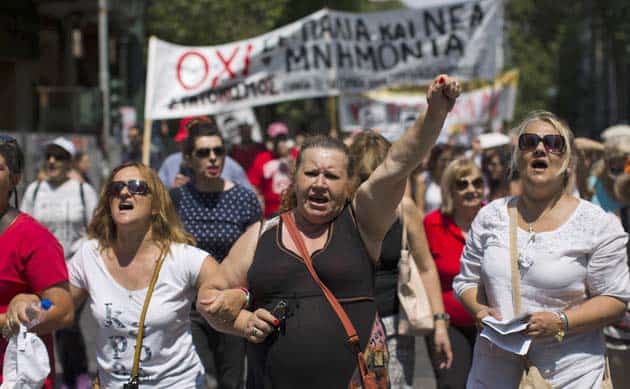The full scale of the EU’s ruthless contempt for ordinary people has been revealed in the new austerity deal imposed on Greece.
EU leaders demanded complete surrender from Prime Minister and Syriza leader Alexis Tsipras, determined to make an example of Greece for daring to challenge austerity.
But rarely has there been such an abject and rapid capitulation as that of the Syriza government.
The Greek people showed magnificent courage and determination to vote “no” in the referendum on a new austerity deal. The Syriza government campaigned for a no vote. But just a week later it signed up to measures far worse than those it told the people of Greece to reject in the vote.
Tsipras was “crucified” in the negotiations according to one Eurozone official. Former Finance Minister Yanis Varoufakis, who resigned following the referendum, said the deal was a “catastrophe” and meant “humiliation”. The Financial Times called it, “the most intrusive economic supervision programme ever mounted in the EU.”
It includes increases to VAT (the Greek GST), cuts to pensions and the return of strict supervision on government spending and other actions. There will be €50 billion of privatisation, with the assets shifted out of government control into a special fund to manage the sales.
The Syriza government must even undo actions taken since its election in January that reverse previous austerity measures. EU President Jean-Claude Junker said explicitly that this includes reversing the reinstatement of cleaning workers and the reopening of public broadcaster ERT, whose struggles became symbolic of the anti-austerity movement under the previous government.
The threat of expelling Greece from the Eurozone was used to blackmail the government into accepting new bailout loans, needed to prevent a collapse of the Greek banks and a default on its debts.
This capitulation is the end result of Tspiras’s determination to keep Greece in the EU. When Syriza was elected many pointed to the 80 per cent support for EU membership in the Greek population to justify this. But as reality has proved, there is no way to do a deal that placates Europe’s rulers and remain in the EU as well as repair the living standards of the Greek people.
Syriza’s failure
These events are a real blow to Greek workers, who elected Syriza in January this year to end crippling austerity measures, and voted in overwhelming numbers against austerity in the referendum. They show the failure of the idea that Greece could break with austerity simply by electing a left-wing government, and the limits of a reformist strategy of hoping for change through parliament.
Tsipras suffered a parliamentary revolt when the deal was put to parliament, with 32 Syriza MPs voting against it, including members of the party’s Left Platform as well as former Finance Minister Yanis Varoufakis. The agreement went through, with the support of votes from the right-wing parties.
But the fight against austerity is far from over. It is now up to Greek workers to take matters into their own hands, through building struggles outside parliament powerful enough to stop the new austerity measures and win change.
That fight has already begun. On the day it was approved in parliament, the public sector union held a 24-hour strike against the deal. They were joined by hospital workers, metro workers and the cleaners whose jobs are now on the line again. Tens of thousands have staged new mass demonstrations against the agreement.
They will be flashpoints as workers resist privatisation and look to demand wage rises to make up for the increase in VAT. Prior to the deal, there had already been a strike against privatisation of the ports.
Workers need to fight for an alternative to the austerity imposed within the iron grip of the EU and the Troika.
As the Greek anti-capitalist coalition Antarsya is arguing, this must be based on an exit from the European Union, in order to default and refuse to pay Greece’s debts, nationalisation of the banks and seizing the wealth of the rich.
Key to the success of this is strengthening the influence of the revolutionary left. It is in the workplaces and on the streets that the fight to end austerity and make the rich pay for the crisis must be won.
By James Supple






